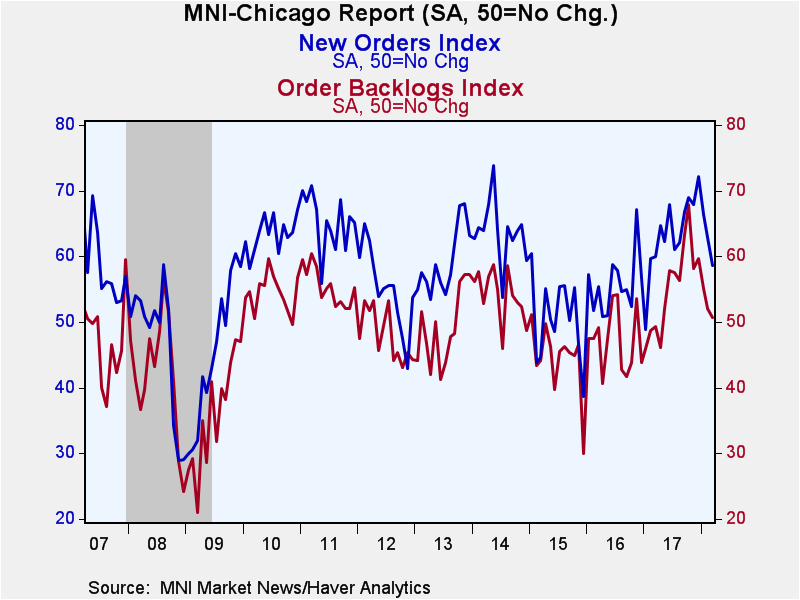 Global| Mar 29 2018
Global| Mar 29 2018Chicago Purchasing Managers Index Declines Sharply
by:Tom Moeller
|in:Economy in Brief
Summary
The Chicago Purchasing Managers Business Barometer for March fell to 57.4 following a decline to 61.9 in February. It was the lowest index level in twelve months and compared to December's peak of 67.8. Stability at 62.0 had been [...]
The Chicago Purchasing Managers Business Barometer for March fell to 57.4 following a decline to 61.9 in February. It was the lowest index level in twelve months and compared to December's peak of 67.8. Stability at 62.0 had been expected in the Action Economics Forecast Survey. Purchasing Managers figures are diffusion indexes where readings above 50 indicate growth.
Based on these figures, Haver Analytics constructs an index that is comparable to the ISM Composite index. The figure fell to 59.3 from 60.7. It was the lowest index level since August of last year. During the last ten years, there has been a 66% correlation between the index and the q/q change in real GDP.
The decline in the total index reflected broad-based component weakness. Production weakened to the lowest point since October 2016. New orders similarly declined to the lowest point since January of last year, and order backlogs were at an 11-month low. Working higher were the inventories and supplier delivery indexes. The index showed much slower product delivery speeds versus early-2016.
The jobs index increased moderately and remained up sharply from the June 2016 low. Twenty-one percent of firms (NSA) reported higher payrolls while eight percent reported them lower. During the last ten years, there has been a 79% correlation between the employment index and the m/m change in factory sector payrolls.
The prices paid measure improved slightly to 69.9 from its six-month low. A strengthened forty-eight percent (NSA) of respondents reported paying higher prices while a steady four percent paid less.
The MNI Chicago Report is produced by MNI/Deutsche Borse Group in partnership with ISM-Chicago. The survey covers a sample of over 200 purchasing professionals in the Chicago area with a monthly response rate of about 50%. The ISM-Adjusted headline index is calculated by Haver Analytics using these data to construct a figure with the ISM methodology. Summary data are contained in Haver's USECON database, with detail, including the ISM-style index, in the SURVEYS database. The Consensus expectations figure is available in AS1REPNA.
| Chicago Purchasing Managers Index (%, SA) | Mar | Feb | Jan | Mar '17 | 2017 | 2016 | 2015 |
|---|---|---|---|---|---|---|---|
| General Business Barometer | 57.4 | 61.9 | 65.7 | 57.1 | 60.8 | 53.1 | 50.3 |
| ISM-Adjusted General Business Barometer | 59.3 | 60.7 | 65.9 | 56.8 | 59.0 | 52.0 | 51.6 |
| Production | 55.2 | 67.9 | 73.4 | 61.0 | 64.3 | 54.7 | 52.5 |
| New Orders | 58.6 | 62.9 | 66.4 | 59.9 | 63.5 | 55.7 | 50.4 |
| Order Backlogs | 50.7 | 52.0 | 55.1 | 49.3 | 55.2 | 47.2 | 44.4 |
| Inventories | 59.5 | 54.9 | 63.5 | 57.6 | 54.9 | 47.2 | 52.1 |
| Employment | 59.4 | 56.1 | 60.7 | 50.5 | 52.9 | 49.4 | 50.3 |
| Supplier Deliveries | 63.8 | 61.5 | 65.3 | 55.1 | 59.4 | 52.8 | 52.5 |
| Prices Paid | 69.9 | 65.0 | 72.1 | 63.1 | 64.0 | 53.2 | 46.8 |
Tom Moeller
AuthorMore in Author Profile »Prior to joining Haver Analytics in 2000, Mr. Moeller worked as the Economist at Chancellor Capital Management from 1985 to 1999. There, he developed comprehensive economic forecasts and interpreted economic data for equity and fixed income portfolio managers. Also at Chancellor, Mr. Moeller worked as an equity analyst and was responsible for researching and rating companies in the economically sensitive automobile and housing industries for investment in Chancellor’s equity portfolio. Prior to joining Chancellor, Mr. Moeller was an Economist at Citibank from 1979 to 1984. He also analyzed pricing behavior in the metals industry for the Council on Wage and Price Stability in Washington, D.C. In 1999, Mr. Moeller received the award for most accurate forecast from the Forecasters' Club of New York. From 1990 to 1992 he was President of the New York Association for Business Economists. Mr. Moeller earned an M.B.A. in Finance from Fordham University, where he graduated in 1987. He holds a Bachelor of Arts in Economics from George Washington University.
More Economy in Brief
 Global| Feb 05 2026
Global| Feb 05 2026Charts of the Week: Balanced Policy, Resilient Data and AI Narratives
by:Andrew Cates










